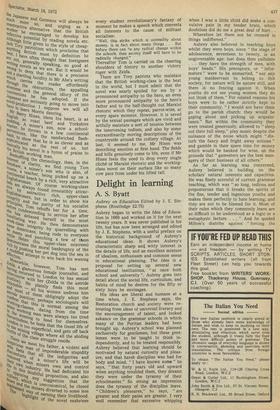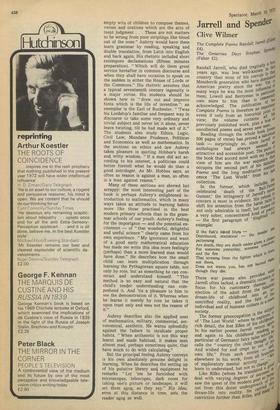Delight in learning
A. S. Byatt
Aubrey on Education Edited by J. E. Stephens (Routledge £2.75) Aubrey began to write the Idea of Education in 1669 and worked on it for the next twenty years. It was never published in his life, but has now been arranged and edited by J. E. Stephens, with a useful preface on the historical background of Aubrey's educational ideas. It shows Aubrey's characteristic sharp and witty interest in the details of life, and an excellent mixture of idealism, enthusiasm and common sense in educational planning, The Idea is a proposal for setting up several new educational institutions, "at once both school and university ". Aubrey goes into detail about the social life, curriculum, and habits of mind he desires for the fifty or sixty boys he envisages.
His ideas are liberal and humane at a time when, J. E. Stephens says, the Restoration church and society were retreating from ideas of universal literacy and the encouragement of talent, and looked askance on the grammar schools in which many of the Puritan leaders had been brought up. Aubrey's school was planned exclusively for gentlemen, but these gentlemen were to be taught to think independently, and to be treated responsibly. Aubrey believed that learning should be motivated by natural curiosity and pleasure, and that harsh discipline was bad for body and mind. "I have known some he says, "that forty years old and upward when anything troubled them, they dreamt they were under the tyranny of their schoolmaster." SO strong an impression does the tyranny of the discipline leave. "Children's pleasures," he says, "are greater and their pains are greater. I very well remember that excessive whipping when I was a little child did make a convulsive pain in my tender brain, which doubtless did do me a great deal of hurt . . . Wherefore let them not be crossed in things indifferent."
Aubrey also believed in teaching boys whilst they were boys, since "the stage of adolescence, seventeen to twenty, is an ungovernable age: lust does then pullulate . . . they have the strength of men, with boys' heads." His preceptors, or " informators " were to be unmarried, "nor any young maidservant to belong to this society, for nature will be nature still, and there is no fencing against it. When youths do not see young women they do not think of them." For related reasons his boys were to be rather strictly kept to their community. "I would not have them go to the parish church: they would be gaping about and picking up acquaintance." But within the community they were treated generously, allowed to "sleep out their full sleep," play music despite the nuisance of the noise which might "disturb the fancy and fright away notions" and gamble in their spare time for money which would be banked for wine, on the grounds that "gamesters are the best managers of their business of all others."
As far as learning was concerned, Aubrey believed in building on the scholars' natural interests and capacities. He was finely scornful of current grammar teaching, which was "so long, tedious and preposterous that it breaks the spirits of the fine, tender and ingenious youths and makes them perfectly to hate learning; and they are not to be blamed for it. Most of their rules which they commonly learn are as difficult to be understood as a logic or a metaphysic lecture . . " And he quoted Milton's diatribe against " forcing the empty wits of children to compose themes, verses and orations which are the acts of inept judgment . . . These are not matters to be wrung from poor striplings like blood out of the nose." Aubrey would have them learn grammar by reading, speaking and double translation, from Latin into English and back again. His rhetoric included short extempore declamations (fifteen minutes preparation). "Which will do them great service hereafter in common discourse and when they shall have occasion to speak on the sudden in either the House of Lords or the Commons." His rhetoric assumes that a typical seventeenth century ingenuity is a major virtue. His students should be shown how to "draw out and improve hints which is the life of invention ": an exemplar is the Earl of Rochester. " 'Twas his Lordship's familiar and frequent way in discourse to take some very ordinary and trivial subject and never let it alone, never leave twisting, till he had made wit of it." The students also study Ethics, Logic, Civil Law, Mundane Prudence, Politicas and Economics as well as mathematics. In the sections on ethics and law Aubrey takes pleasure in quoting Hobbes's harsh and, witty wisdom. "If a man did act according to his interest, a politician could better foretell what he would do than a good astrologer. As Mr. Hobbes says, as often as reason is against a man, so often is a man against reason."
Many of these sections are shrewd but scrappy: the most interesting part of the book is perhaps Aubrey's enlightened introduction to mathematics, which in many ways takes an attitude to learning habits more like those practised in the best modern primary schools than in the grammar schools of our youth. Aubrey's feeling for the importance — and the potential excitement — of "that wonderful, delightful and useful science" clearly came from his own experience. "My ignorance and want of a good early mathematical education has made me write this idea more feelingly (perhaps) than a more learned man would have done." He describes how the small child can learn multiplication through learning the Pythagorean square table, not only by rote, but as something he can construct and understand himself. "This method is so easy and natural that the child's tender understanding can comprehend it. And 'tis a pleasure to him to see the demonstration of it. Whereas when he learns it merely by rote he takes it upon trust only and sees not the reason of it."
Aubrey describes also the applied uses of mathematics, military, commercial, astronomical, aesthetic. He warns splendidly against the failure to inculcate proper habits. "When arithmetic is not this way learnt and made habitual, it makes men almost mad, perhaps sometimes quite, that have much to do with calculating."
But the principal feeling Aubrey conveys is his own absolutely genuine delight in learning. When he describes the setting up of his putative library and equipment he remarks "Let 'em be furnished with microscopes, telescopes, dark room for taking one's picture or landscape; it will set them agog, as they say." His Idea, even at this distance in time, sets the reader agog as well.











































 Previous page
Previous page